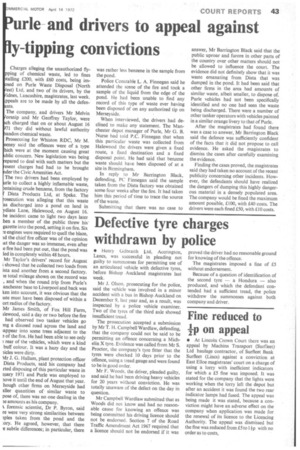re-and drivers to appeal against y-tipping convictions
Page 45

If you've noticed an error in this article please click here to report it so we can fix it.
Charges alleging the unauthorized flypping of chemical waste, led to fines tailing £200, with £60 costs, being imsed on Purle Waste Disposal (North est) Ltd, and two of its drivers, by the idnes, Lancashire, magistrates, last week. ppeals are to be made by all the defennts.
The company, and drivers Mr Melvin orsnip and Mr Geoffrey Taylor, were ch charged that on or about August 16 71 they did without lawful authority ndon chemical waste.
Prosecuting for Winston RDC, Mr M. ey said the offences were of a type 'ch were at the moment causing great blic concern. New legislation was being pared to deal with such matters but the esent charges had had to be brought der the Civic Amenities Act.
The two drivers had been employed by le to collect a highly inflamable waste, ntaining crude benzene, from the factory Dista Products Ltd, at Speke. The osecution was alleging that this waste s discharged into a pond on land in yrdiate Lane, Halewood, on August 16. he incident came to light two days later hen a member of the public threw his garette into the pond, setting it on fire. Six engines were required to quell the blaze, ad the chief fire officer was of the opinion at the danger was so immense, even after .e fire had been put out, that the pond was led in completely within 48 hours.
Mr Taylor's drivers' record for August showed that he collected two loads from ista and another from a second factory. le total mileage shown on the record was , and when the round trip from Purle's anchester base to Liverpool and back was ken into account, it was obvious that the Iste must have been disposed of within a ort radius of the factory.
Mr James Smith, of Fox Hill Farm, alewood, said a day or two before the fire had observed two tanker vehicles go mg a disused road across the land and appear into some trees adjacent to the 5 of the fire. He had been able to see only rear of the vehicles, which were a kind buff colour. It was a hazy day and the ticks were dirty.
N4r J. G. Hallam, plant protection officer Dista Products, said his company had rted disposing of this particular waste in tuary 1971 and Purle was employed to :love it until the end of August that year. hough other firms on Merseyside had aller quantities of similar waste to pose of, there was no one dealing in the se amounts as his company.
forensic scientist, Dr P. Byron, said re were very strong similarities between spies taken from the pond and the :ory. He agreed, however, that there e subtle differences; in particular, there was rather less benzene in the sample from the pond.
Police Constable L. A. Finnegan said he attended the scene of the fire and took a sample of the liquid from the edge of the pond. He had been unable to find any record of this type of waste ever having been disposed of on any authorized tip on Merseyside.
When interviewed, the drivers had declined to make any statement. The Manchester depot manager of Purle, Mr G. B. Nurse had told P.C. Finnegan that when this particular waste was collected from Halewood the drivers were given a fixed route, a fixed destination and a fixed disposal point. He had said that benzene waste should have been disposed of at a site in Birmingham.
In reply to Mr Barrington Black, defending, PC Finnegan said the sample taken from the Dista factory was obtained some four weeks after the fire. It had taken him this period of time to trace the source of the waste.
Submitting that there was no case to answer, Mr Barrington Black said that the public uproar and furore in other parts of the country over other matters should not be allowed to influence the court. The evidence did not definitely show that it was waste emanating from Dista that was dumped in the pond. It had been said that other firms in the area had amounts of similar waste, albeit smaller, to dispose of. Purle vehicles had not been specifically identified and no one bad seen the waste being discharged. There were a number of other tanker operators with vehicles painted in a similar orange livery to that of Purle.
After the magistrates had found there was a case to answer, Mr Barrington Black said the defence was sufficiently confident of the facts that it did not propose to call evidence. He asked the magistrates to dismiss the cases after carefully examining the evidence.
Finding the cases proved, the magistrates said they had taken no account of the recent publicity concerning other incidents. However, the defendants should have realized the dangers of dumping this highly dangerous material in a densely populated area. The company would be fined the maximum amount possible, £100, with £40 costs. The drivers were each fined £50, with £10 costs.




















































































































































